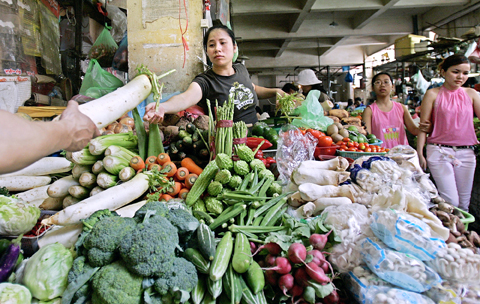Surging food and construction costs drove Vietnam's inflation rate to 25.2 percent this month, the highest in more than a decade, the government said yesterday.
Despite authorities' efforts to control inflation, including interest rate hikes, consumer prices were 4 percentage points higher than last month, the Government Statistics Office said.
Vietnam’s inflation rate is among the highest in Asia, and higher food prices in particular are hurting the country’s poor.

PHOTO: AP
Overall food costs were up 42.4 percent from a year ago, driven by a 67.8 percent jump in the price of grain, including rice, the staple food. Housing and construction materials rose 22.9 percent over last year.
Analysts say Vietnam’s surging inflation is driven by both domestic and global forces, including soaring fuel and food costs.
Rapid economic growth and looser lending policies in recent years — which has spurred investment —have also contributed.
The communist government has made fighting inflation its top priority. The central bank raised by interest rates 3 percentage points to restrain borrowing and encourage saving.
In the past few months, the government has also postponed public investment projects and ordered state agencies to cut spending by at least 10 percent.
The impact of these policy changes are likely to be felt in the second half of the year, said Jonathan Pincus, chief economist of the UN Development Program in Hanoi.
“The economy is still healthy, with exports and foreign direct investment soaring,” he said.
Vietnam’s exports were up 27 percent this month from a year ago, and foreign investment pledges reached US$15.3 billion in the first five months of this year, more than double the same period last year.
Still, authorities foresee slower growth ahead.
Earlier this month, the Vietnamese government slashed its annual growth target to 7 percent from 8.5 percent.

WAITING GAME: The US has so far only offered a ‘best rate tariff,’ which officials assume is about 15 percent, the same as Japan, a person familiar with the matter said Taiwan and the US have completed “technical consultations” regarding tariffs and a finalized rate is expected to be released soon, Executive Yuan spokeswoman Michelle Lee (李慧芝) told a news conference yesterday, as a 90-day pause on US President Donald Trump’s “reciprocal” tariffs is set to expire today. The two countries have reached a “certain degree of consensus” on issues such as tariffs, nontariff trade barriers, trade facilitation, supply chain resilience and economic security, Lee said. They also discussed opportunities for cooperation, investment and procurement, she said. A joint statement is still being negotiated and would be released once the US government has made

NEW GEAR: On top of the new Tien Kung IV air defense missiles, the military is expected to place orders for a new combat vehicle next year for delivery in 2028 Mass production of Tien Kung IV (Sky Bow IV) missiles is expected to start next year, with plans to order 122 pods, the Ministry of National Defense’s (MND) latest list of regulated military material showed. The document said that the armed forces would obtain 46 pods of the air defense missiles next year and 76 pods the year after that. The Tien Kung IV is designed to intercept cruise missiles and ballistic missiles to an altitude of 70km, compared with the 60km maximum altitude achieved by the Missile Segment Enhancement variant of PAC-3 systems. A defense source said yesterday that the number of

Taiwanese exports to the US are to be subject to a 20 percent tariff starting on Thursday next week, according to an executive order signed by US President Donald Trump yesterday. The 20 percent levy was the same as the tariffs imposed on Vietnam, Sri Lanka and Bangladesh by Trump. It was higher than the tariffs imposed on Japan, South Korea and the EU (15 percent), as well as those on the Philippines (19 percent). A Taiwan official with knowledge of the matter said it is a "phased" tariff rate, and negotiations would continue. "Once negotiations conclude, Taiwan will obtain a better

FLOOD RECOVERY: “Post-Typhoon Danas reconstruction special act” is expected to be approved on Thursday, the premier said, adding the flood control in affected areas would be prioritized About 200cm of rainfall fell in parts of southern Taiwan from Monday last week to 9am yesterday, the Central Weather Administration (CWA) said. Kaohsiung’s Taoyuan District (桃源) saw total rainfall of 2,205mm, while Pingtung County’s Sandimen Township (三地門) had 2,060.5mm and Tainan’s Nanhua District (南化) 1,833mm, according to CWA data. Meanwhile, Alishan (阿里山) in Chiayi County saw 1,688mm of accumulated rain and Yunlin County’s Caoling (草嶺) had 1,025mm. The Pingtung County Government said that 831 local residents have been pre-emptively evacuated from mountainous areas. A total of 576 are staying with relatives in low-lying areas, while the other 255 are in shelters. CWA forecaster